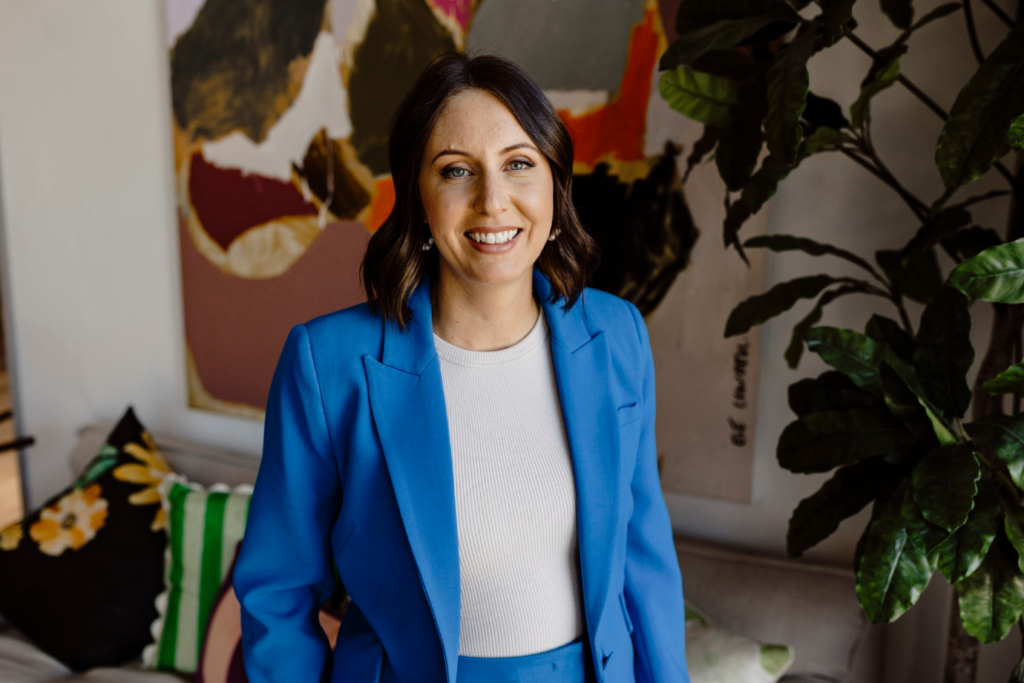When Molong, a small town in central west New South Wales, was hit by devastating floods in 2022, Kirsty Evans, a local lawyer, stepped up to lead efforts in supporting dozens of local businesses devastated by the floods, using her legal expertise to navigate the complex insurance landscape.
As a partner at Cheney Suthers Lawyers, she spent over 250 hours of pro bono legal work and successfully secured over $1 million in payouts for 12 businesses in her community.
The morning the floods hit, Kirsty’s husband rushed out to help people with the flood clean up, while Kirsty sent out texts to business owners, asking them to send over their insurance policies. “If we could get businesses reopened quickly, it would enable them to start earning a livelihood again, not to mention lift the whole town’s spirits,” she says.
“It just felt like the right thing to do, I critique legal documents for a living, so I knew I could take that burden off people’s shoulders.”
Her efforts have made her a fierce advocate for insurance reform, culminating in her testimony at the Parliamentary Inquiry into Insurers’ Response to National Disasters, which will be announced on October 18.
From law partner to grassroots advocate
As the floodwaters receded, Kirsty realised the depth of misinformation and underinsurance affecting her community.
“Many business owners didn’t know their policies left them exposed, and the claims process was almost impossible to navigate without legal help,” she says.
Kirsty’s legal expertise allowed her to process claims and fight initial denials. One of her toughest cases was with the local post office, which received a impersonal, one-line email stating its claim was denied. This insurance claim isn’t just about paperwork, it’s a lifeline to rebuilding a business, an income to feed a family and keep a roof over their head.
“Seeing that first denial come through sent a shock through the community. It was like watching dominos, each business bracing themselves for the rejection. It was gut-wrenching. No empathy, no support—just a cold ‘No.’
“Despite the open hostility from the insurers, I knew I had the experience, and perhaps the mongrel mindset to chase down the money they were owed. I told my clients, ‘We’re not giving up.’ And we didn’t.”
Face-to-face with insurance CEOs
Eighteen months after the floods, despite invitations and outreach, Kirsty finally met with the CEOs of NRMA and IAG, in Molong.
“It was their first time setting foot in the community, and they couldn’t even explain their own policies,” she recalls. “It was clear they were there to tick a box for the inquiry, not to make real change.”
The disconnect between insurers’ billion-dollar profits and the suffering of flood victims still infuriates Kirsty.
“While people were waiting for payouts, IAG announced a 7.9 per cent increase in profits. That’s $898 million. It’s disgusting.”
A system that adds trauma to crisis
Kirsty has been outspoken about the secondary trauma inflicted by insurers.
“After losing everything, people had to relive their trauma through endless paperwork and rejections,” she says.
“Claims handlers were unprepared to deal with people in such emotional distress.”
Her advocacy focuses on trauma-informed training for insurance personnel and assigning consistent case managers as the bare minimum.
“We need people handling claims to understand the vulnerability of those they’re working with, especially after disasters,” she explains.
A resilient advocate for change
Kirsty admits the fight has been exhausting. “There were moments when I felt overwhelmed, especially when it seemed like the system was stacked against us. But giving up was never an option,” she says.
Today, the businesses she fought for are thriving, but her work isn’t over. “This isn’t just about insurance—it’s about trust,” she says. “Without trust, how do we rebuild anything at all?”
The Molong story is one of resilience, advocacy, and community strength. The collective efforts have not only brought financial relief to flood victims but have also sparked conversations about how Australia must reform its disaster response systems.
Kirsty continues to push for better policies and practices, determined to ensure that communities like Molong are better prepared—and better protected—when the next disaster strikes.
Insurance industry overhaul
Kirsty’s advocacy centres around five key issues raised during the parliamentary inquiry, many of which were highlighted in a Deloitte Report that investigated flood insurance failures:
- Consultation failures: Currently, many policyholders are unaware of changes in their coverage because insurers follow a “set and forget” approach. Kirsty advocates for a more proactive consultation process between insurers and customers.
- Customer vulnerability: Kirsty has raised concerns about the inadequate training of claim processors, especially during a disaster, when claimants are emotionally and financially vulnerable.
- Underinsurance: Kirsty has highlighted cases where people were penalised for underinsuring without being properly informed, urging reforms to help customers adequately insure themselves.
- Protracted claim processing: Many flood victims faced delays of 12 to 18 months before their claims were processed. Kirsty has called for quicker claims processing, especially for businesses that depend on insurance payouts to reopen.
- Building constraints: Kirsty is pushing for insurers to utilise local builders when obtaining quotations or engagement for repairs. Insurers are using companies listed on the ASX to quote repair work where such builders have access to large manufacturing and distributor discounts. When compared to local builders, the cost are substantially different. This is particularly out of touch when the insurer’s builder isn’t going to carry out or warrant the repair work and they are simply using their panel builder to provide a lower quote. Utilising local builders will also help the community return to business after the disaster.
Feature image: Kirsty Evans.

